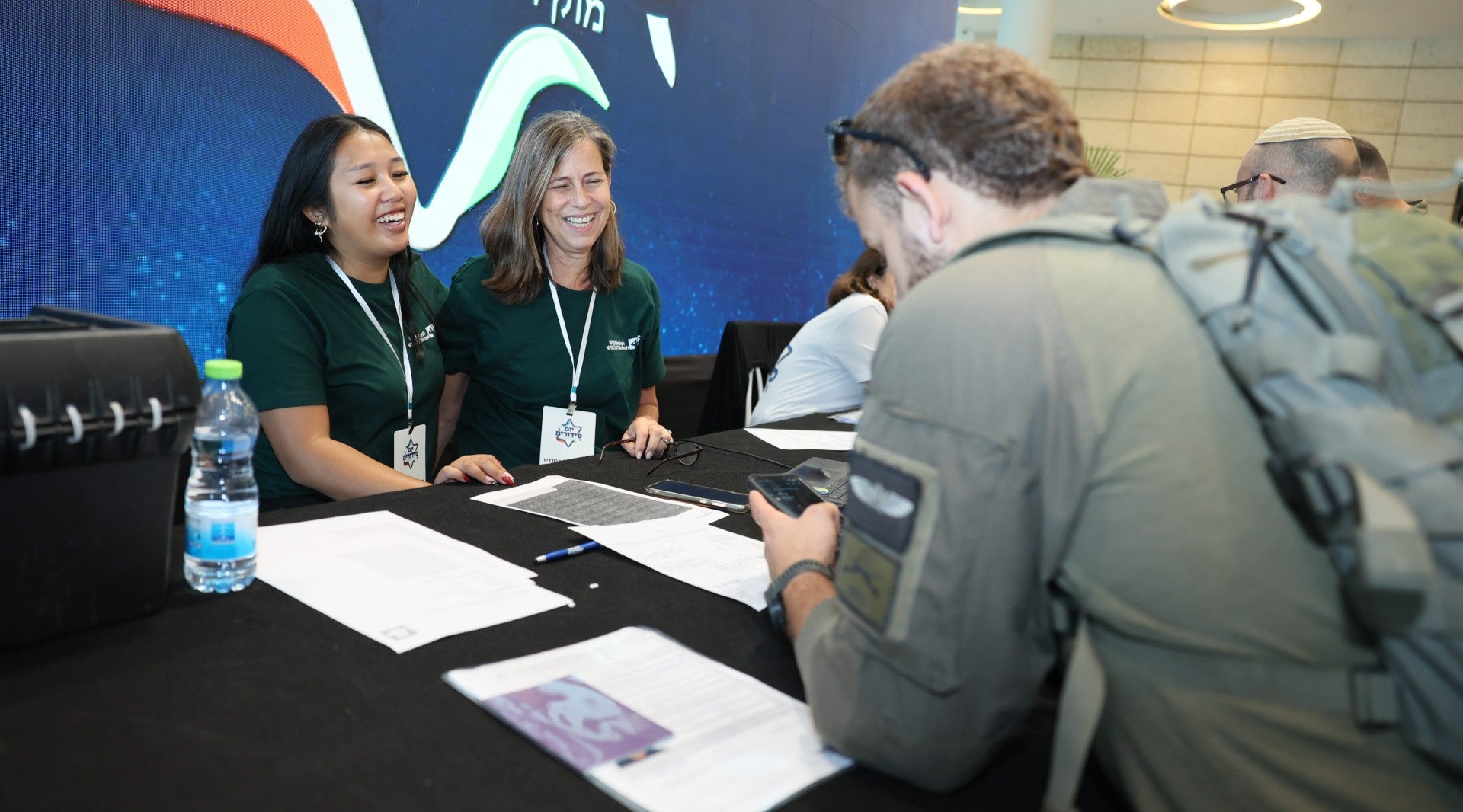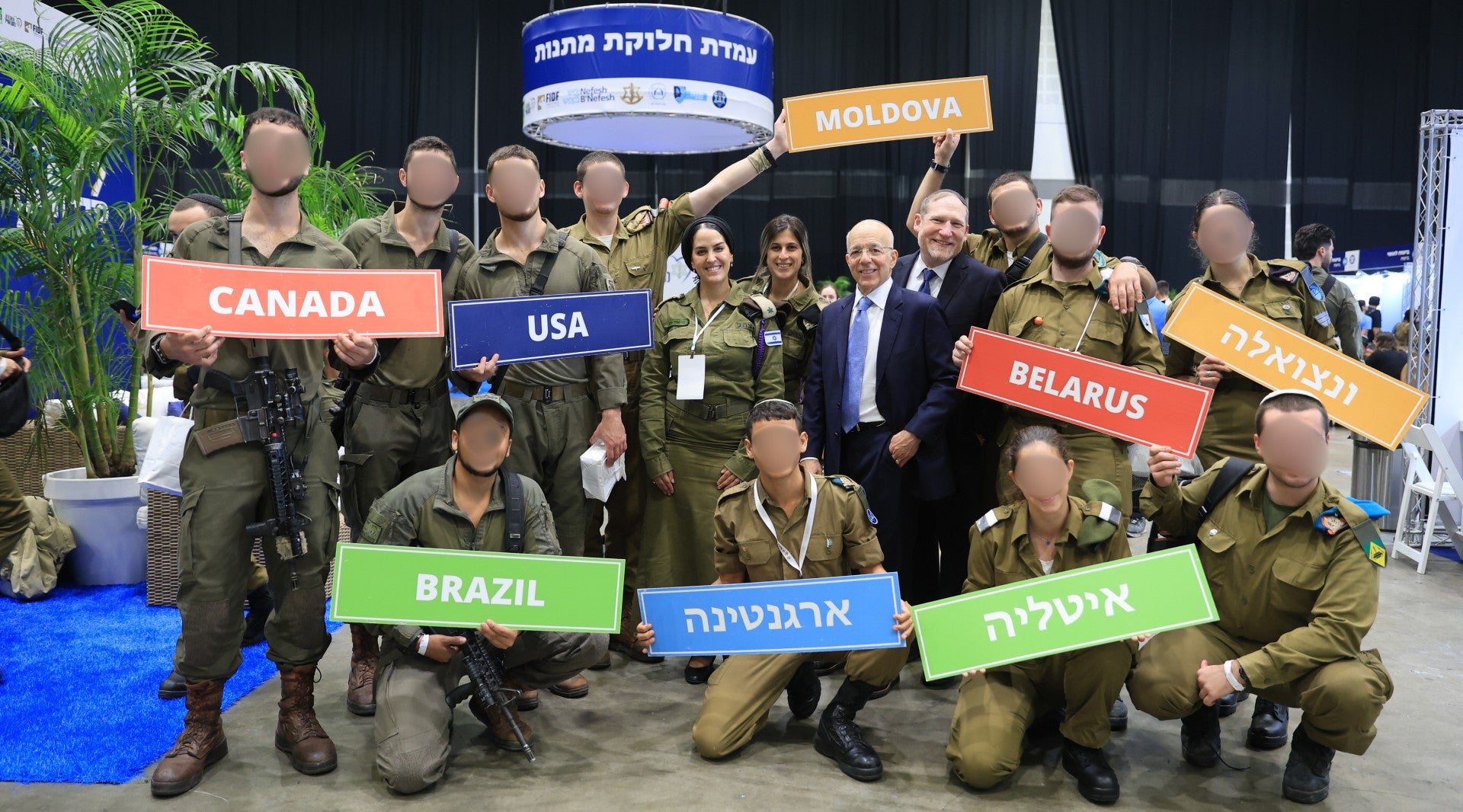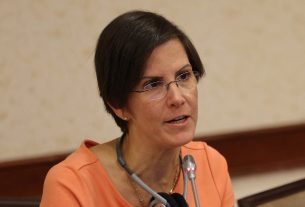TEL AVIV — When A. moved from Florida to Israel after high school and began his mandatory service in the Israel Defense Forces, he knew it would be challenging to serve in a combat unit far from his family.
“Combat service has been very difficult,” said A., whose name is being withheld to protect his identity, like those of other soldiers cited in this story. “I’ve had to face challenges I never could have imagined. But you go through it, and you come out able to handle things — even better than I could have before in my civilian life.”
Several months on, however, A., 19, still has trouble handling his civilian To Do list — like getting an Israeli driver’s license. He just has no time for it.
So when he heard that the Friends of the IDF-Nefesh B’Nefesh Lone Soldiers Program, in partnership with the Mofet Unit of the IDF Manpower Directorate and the Association for Israel’s Soldiers, was organizing an Errands Day event in Tel Aviv for Lone Soldiers — where representatives of banks, government offices, employment organizations, and numerous other service providers would be on hand to ease and expedite errands for soldiers without immediate family in Israel — A. was thrilled.
At the all-day, mid-November event at the Tel Aviv Expo center, which drew over 4,000 Lone Soldiers from 70 different countries, A. went to get his driver’s license and was astonished to find more than 70 volunteer driving instructors and 60 certified examiners speeding soldiers through one of Israel’s most notoriously bureaucratic processes. It took A. just minutes to obtain his license, printed by a biometric machine on site.
“It was on the spot!” he marveled. “It was a big thing I needed to do. It’s all stuff that is really helping me out.”
The mass-scale Yom Siddurim (Errands Day) was the largest ever, and the first to be held since Oct. 7, 2023. Over the last two years of war, holding such an event was impossible because the IDF couldn’t spare thousands of soldiers all on the same day during the height of the war, according to Rabbi Yehoshua Fass, co-founder and executive director of Nefesh B’Nefesh. The mission of his organization, which began with a holistic approach to facilitating aliyah (immigration to Israel) from North America, has broadened to encompass supporting Israeli national service, development of the country with a focus on its periphery and Zionist education.
For a day, the Tel Aviv Expo center was turned into a one-stop shop for nearly every bureaucratic, logistical and personal need a Lone Soldier could face.
Soldiers renewed their passports, sorted out payments from Israel’s National Insurance Institute and got free haircuts from on-site barbers. They lined up at booths to meet with representatives of government ministries, embassies, banks, the Electric Company, the Population Authority, and numerous NGOs. They got a hot lunch and even availed themselves of tailors on site to hem their military-issue pants and skirts.
Soldiers line up to meet with representatives of banks, government agencies, embassies, and others marshalled to Tel Aviv for a single Errands Day event designed to help Lone Soldiers speed through bureaucratic processes that normally take weeks or months, Nov. 13, 2025. (Sivan Shachor)
Though all wearing Israeli army uniforms, the soldiers hailed from all over the globe — including native Israelis considered Lone Soldiers because they don’t have immediate family they can rely upon in Israel.
“We know these soldiers come from all over the world to serve,” said Roni, a representative of the IDF unit that cares for Lone Soldiers. “Our job is to make sure they know their rights: vacation days, housing assistance, financial benefits, refunds for flights to see their families. We run a 24/7 hotline. Everything we do is so they know they’re not alone.”
Y., a 25-year-old infantryman from Canada who moved to Israel in August 2023, said the hardest part about being a Lone Soldier is the distance from his family.
“My teammates took me in like brothers,” said Y. “They see their parents every few weeks; I don’t. I am missing my family and want to see them.”
Y. utilized his time at the Yom Siddurim getting his North American undergraduate degree officially recognized so he can enroll in a master’s program in Israel after he finishes the army. He also was able to get answers about rent payments and the process for enrolling in ulpan (Hebrew language classes).
A 21-year-old Lone Soldier originally from Russia, D., used the day to take care of paying his municipal taxes, sorting out his electricity bill and getting new national ID cards.
“I need everything,” D. said, “and here we can do all of it. The atmosphere is happy. We have presents, food, drinks. And today I’m not in the army,” he added with a laugh. “It’s a good day.”
M., a 24-year-old American woman, moved to Israel after graduating from Georgia Tech with a degree in biochemistry. Through the army’s academic track, which deploys degree-holders in technical and relevant positions as officers, M. became a hazardous materials officer for Israel’s Home Front Command.
“Oct. 7 happened in the first semester of my senior year. I realized I wanted my life to be meaningful,” M. said of her decision to immigrate to Israel. “I wanted to serve the Jewish people.”
With an army job focused on keeping factories and citizens safe, she said the Errands Day event was a reminder of how Israel is also taking care of her.
“It’s touching,” she said. “It shows there is actually infrastructure to help olim [new immigrants] and the citizens.”

The Errands Day event in Tel Aviv, known as a Yom Siddurim, was organized by the Friends of the IDF-Nefesh B’Nefesh Lone Soldiers Program in partnership with the Mofet Unit of the IDF Manpower Directorate and the Association for Israel’s Soldiers. (Bar Bino)
That’s exactly the point, said Nadav Padan, CEO of Friends of the IDF and a major general in the IDF reserves.
“Yom Siddurim is one of the many ways FIDF shows our deep appreciation and support for the young men and women who volunteer to serve in the IDF,” Padan said. “We aim to ensure they know they are never alone, and that they have a family of supporters across the United States standing with them. Through comprehensive support that includes financial assistance, housing, flights home, community events and mental health support, FIDF is committed to easing their experience so they can focus fully on their vital mission of protecting the State of Israel.”
In addition to service providers of all kinds, Knesset members from across the political spectrum stopped by, including Minister of Aliyah and Integration Ofir Sofer, Likud’s Yuli Edelstein and Gadi Eisenkot, a former IDF chief of staff and Knesset member.
“This is our nation,” said Nefesh B’Nefesh’s co-founder and chairman, Tony Gelbart. “That celebration of unity, with this as the anchor, is uplifting.”
Fass said that one of the government ministers on hand was so taken with the event that he wants to re-create it for Israelis displaced by the Oct. 7 war, who despite their return home face all sorts of bureaucratic hurdles ranging from getting compensation for lost income to accessing mental health services.
“I said take it! Copy and paste it. It’s modular,” Fass said.
“The young men and women who make aliyah, and are required to serve in the IDF, embody an extraordinary commitment to the State of Israel, driven by a strong Zionist spirit and a deep desire to contribute to our nation,” Fass and Gelbart said in a joint statement. “This year’s Yom Siddurim is a powerful reminder of our responsibility to support these new olim, provide for their needs and demonstrate our gratitude for their ongoing service to the Jewish nation.”
Power the news that matters to you. Before 2025 ends, help (JEWISH REVIEW)’s independent, award-winning newsroom document Jewish history in real-time.




